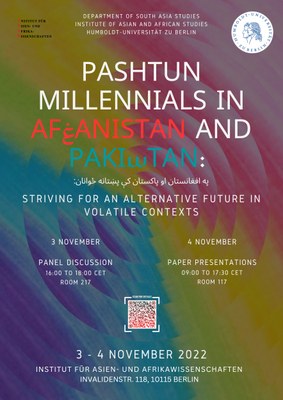03.11 - 04.11.2022 Pashtun Millennials in Afghanistan and Pakistan: Striving for an alternative future in volatile contexts
- https://www.iaaw.hu-berlin.de/de/region/suedasien/pashtung-millennials-in-afghanistan-and-pakistan-striving-for-an-alternative-future-in-volatile-contexts
- 03.11 - 04.11.2022 Pashtun Millennials in Afghanistan and Pakistan: Striving for an alternative future in volatile contexts
- 2022-11-03T16:00:00+01:00
- 2022-11-04T18:00:00+01:00
- Wann 03.11.2022 16:00 bis 04.11.2022 18:00
- Wo Invalidenstraße 118, Do. Raum 217, Fr. Raum 117
- Name des Kontakts Dr. Sarah Holz
-
iCal

No registration required.
Download the programme here.
Afghanistan and Pakistan, where the majority of the global Pashtun population lives, have some of the youngest and fastest growing populations globally. A youth bulge can either be an asset or a liability; depending on how public and private sector policies engaging the youth in productive political, educational, economic and socio-cultural activities. This conference seeks to draw out the activities, practices, struggles, opportunities, hopes and dreams for the future of the Pashtun youth in Afghanistan and Pakistan.
By now, the majority of the Pashtun millennials, born between the mid 1980s and the late 1990s have already lived through various multi-faceted challenges: socio-economic and political instabilities, civil strife, the global War on Terror, religious extremism, gender inequalities and ethnic marginalisation and climate change are only some of them. Decades of national and international geo-political struggle for the control over Pashtun regions have affected the millennials’ ideas, life style and work choices. As a consequence of these volatilities, Pashtun society is in constant flux and Pashtun culture has to accommodate these changes in order to nourishing its future generations to ensure livelihood. The youth has taken active part in practices and activities related to political activism, civic engagement or religious harmony to fill vacuums in political leadership, governance and provisions of basic facilities for their communities.
The conference engages primarily young researchers and focuses on the following questions: What are the contributions and struggles of Pashtun millennials for their society/community? How do Pashtun millenials participate in various socio-economic, political, religious and educational activities? How does the Pashtun youth engage with contemporary issues in academia, media, civil society and politics?

